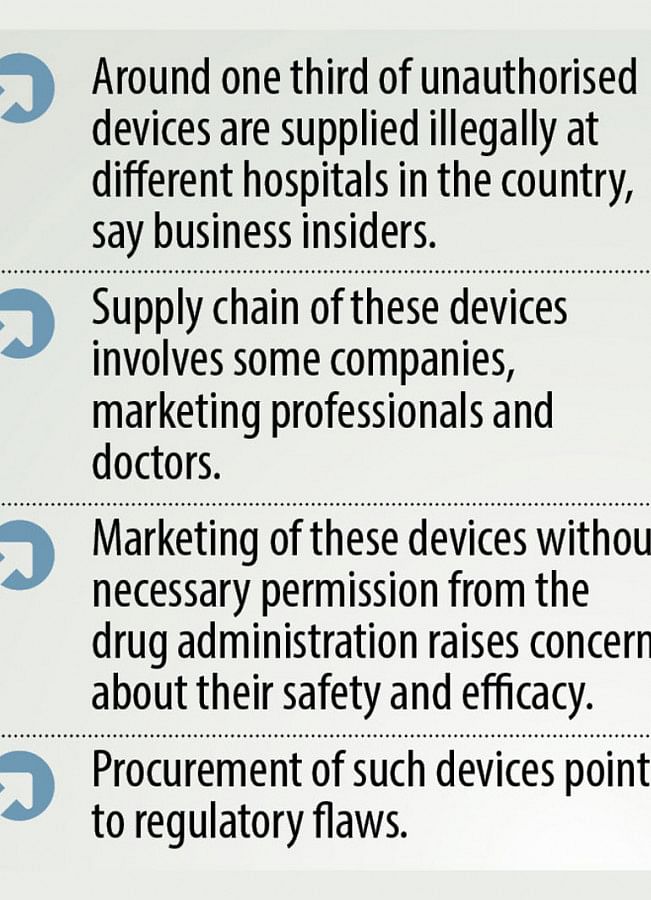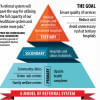Cardiac Implants For Children: Top hospitals using unauthorised devices
Unauthorised companies are smuggling a number of cardiac medical devices into the country and selling those to some of Dhaka's top public and private hospitals without proper vetting, raising questions about health regulations and patient safety.
Over the last one and a half years, these unauthorised devices were used to treat children with congenital heart defects at the government-run National Institute of Cardiovascular Disease and Hospital (NICVD) and National Heart Foundation Hospital as well as private hospital Labaid in the capital, documents show.
Hospital sources and business insiders say a significant number of cardiac medical devices for children is in fact supplied illegally at different hospitals across the country.
Some of these devices are marketed without the permission of the drug regulatory body, the Directorate General of Drug Administration, the documents show, exposing regulatory flaws in medical device business.
Experts say unregulated medical devices may jeopardise patient safety and raise concerns about the efficacy and safety of cardiac treatments.
"It is highly likely that unauthorised cardiac products will be of poor quality. They may cause serious harm to patients," said Dr Chowdhury Meskat, a professor of cardiology at Bangabandhu Sheikh Mujib Medical University.
A RAID ON HEARTON
On March 31, the Directorate General of Drug Administration raided the office of Hearton Bangladesh, a medical equipment supplier, in Mirpur and seized devices that are used to treat congenital heart defects among children. The seized cardiac devices were worth Tk 27 lakh.
According to the Registration Guidelines for Medical Device, marketing these devices requires a Maximum Retail Price (MRP) certificate from the DGDA. Hearton Bangladesh did not have the certificate.
The company claimed the products they were selling were produced by Lifetech Scientific, a China-based company, and imported by another local company.
That local company, Rahman Medical Services, has no authorisation for distribution of Lifetech products since 2020, multiple sources have confirmed.
"Anyone involved in illegally importing or marketing these devices should be brought to book. And that's where the drug administration has a role to play."
Following the DGDA raid, The Daily Star has learnt that a number of local companies, marketing professionals and doctors are involved in selling these devices to several city hospitals.
Usri Ghosh, an Indian national, brought these devices into the country and marketed them through Hearton Bangladesh, said sources at the NICVD and Heart Foundation.
Ursi did not return our requests for comments.
The Daily Star has documents showing both the NICVD and the Heart Foundation purchased devices without necessary authorisation on a number of occasions.
Every year, an estimated 1,200 children require cardiac implants in Bangladesh. This year alone, around 30 percent of the devices worth around Tk 3 crore have been supplied by Hearton, sources with direct knowledge of the market said.
From January to September this year, 127 Lifetech devices illegally imported by Hearton were implanted at three top hospitals – 102 at NICVD, 12 at Heart Foundation and 13 at Labaid, the sources have confirmed.

Between September 23 and 27 alone, NICVD used 50 Lifetech cardiac devices to treat as many children.
Earlier on July 7, Lifetech products were used to treat heart defects of 13 children at the Cath Lab of the Labaid Hospital in the capital, documents show.
Brig Gen (retd) Prof Nurun Nahar Fatema, who performed the procedures, shared details about the products on her LinkedIn profile recently.
Contacted, she said she got the devices from her previous supplier, Rahman Medical Services.
"They provide me implants when I need them. But I do not have any idea about the legal issues," said Prof Nurun Nahar.
Mizanur Rahman, owner of Rahman Medical Services, said his company no longer supplies Lifetech products.
THE WORKSHOP THAT NEVER HAPPENED
Hospital sources say after Usri Ghosh had flown in with unauthorised Lifetech Scientific devices on January 16, customs officials at Hazrat Shahjalal International Airport (HSIA) held those for not having the required paperwork and asked her to pay duties to collect those.
The same day, NICVD's Head of Paediatric Cardiology Department Prof Abdullah Shahriar wrote to the HSIA customs commissioner, requesting duty-free release of the products, "meant for a technology transfer workshop" to be held the next day.
Subsequently, the items were released and used to carry out minimally invasive cardiac intervention procedures on 10 children on January 17.
"It is highly likely that unauthorised cardiac products will be of poor quality. Those may cause serious harm to the patients."
Sources said no international workshop was held that day, but Usri Ghosh was present when cardiac intervention procedures were carried out on the children using those devices.
Prof Shahriar wrote the letter on the letterhead of Labaid Diagnostics, a private hospital where he is a consultant. The Daily Star has a copy of the letter.
The letter also mentioned that an Indian paediatric cardiologist named Dr Neeraj Awasthy would conduct the workshop.
Dr Awasthy declined to comment and asked this correspondent to speak to the authorities.
Prof Shahriar said he had no idea that Hearton had no authorisation from the DGDA.
"We had been using Lifetech products for the past one and a half years. We stopped using their products as soon as we learnt about this," he told The Daily Star.
Asked why he wrote the letter, he said, "Hearton officials approached me, saying the NICVD director referred them to me as he [NICVD director] was unavailable at the time."
NICVD Director Prof Mir Jamal Uddin denied having any knowledge about the letter.
He also said he was not aware of any "international workshop" taking place on January 17.
As for scrutinising suppliers' documents, he said the director's office does not have any role in purchasing devices that are used commercially on patients.
"We just procure devices for the hospital stock, which is supplied free of cost for poor patients, and the funds for those come from the government or donors. The unit chiefs are responsible for allowing any company to sell their products to the patients inside the hospitals."

A MERRY-GO-ROUND
In early March, Lifetech products supplied by Hearton were used at the NICVD to treat at least 47 children with heart conditions during a weeklong charity campaign funded by Qatar Red Crescent Society.
The Daily Star has copies of all the invoices approved by the NICVD for the campaign.
In May, Hearton Bangladesh received around Tk 50 lakh against 47 invoices signed by Prof Abdullah Shahriar.
This newspaper has also obtained a screenshot of a WhatsApp group conversation among prominent cardiac surgeons where Lifetech products were discussed. Dr Muhammad Ataul Haqq, associate professor at NICVD's paediatric cardiology department, favoured these products in the conversation.
"In Bangladesh, we comfortably use Amplatzer devices and Lifetech devices as per the registration with the drug administration. Lifetech products are a little bit cheaper … We can't judge the quality as we don't have any testing facility. But we are comfortable with both the brands," he told the group.
Contacted, Dr Ataul Haqq, who leads the paediatric cardiology department's "green unit," said there was another Dr Ataul who had taken part in the WhatsApp conversation.
His namesake, who has the same position at the same department, said he was not a member of the Qatar Red Crescent campaign committee, and so there was no question of his involvement in this.
He also said he leads the department's "blue unit," not the "green unit".
These units – green and blue – are two groups created by the hospital authorities to facilitate job distribution among physicians and other medical staff.
NICVD sources said the Ataul who leads the "green unit" was the one in the WhatsApp conversation.
Asked about the use of unauthorised Lifetech devices on multiple occasions at the NICVD, Prof Mir Jamal Uddin said, "The issue has been brought to our notice. I have already issued directives to the doctors concerned not to allow the products that lack proper authorisation from the drug administration."
CUT FROM THE SAME CLOTH
The National Heart Foundation Hospital received devices from Hearton for the whole of 2022.
"Hearton submitted relevant documents including the product registration certificate, but they could not provide the MRP certificate from the DGDA. So, we stopped using their products from January this year," said Shahajadee Sultana Doly, additional director of public relations at the Heart Foundation.
Asked why they permitted Hearton for a year, she said Usri Ghosh, manager of Lifetech Scientific in India, introduced Hearton Bangladesh to them.
"Usri Ghosh has been representing different foreign cardiac device makers at Heart Foundation for the last 15 years. In recent years, she started campaigning for Lifetech products. She also sponsored several scientific seminars and supplied many devices for free here," Doly said.
But Heart Foundation Director Brigadier General (retd) Younusur Rahman denied using unauthorised products at the hospital.
ANOTHER COG IN THE WHEEL
Anamul Haque Prince, owner of Hearton Bangladesh, said all of the products they supplied were legally imported by Rahman Medical Services Ltd, former distributor of Lifetech Scientific in Bangladesh.
In 2020, Hearton received 93 devices from Rahman Medical Services, according to an agreement, seen by this paper, between the two parties.
The Daily Star is also in possession of documents that show Hearton supplied many devices to its clients that were collected from sources other than Rahman Medical Services.
Mizanur Rahman, owner of Rahman Medical Services, said, "Lifetech terminated its contract with us in 2020. We have had no business with them since."
He also denied selling or distributing any other devices to Hearton.
A certificate of registration, issued by the DGDA, also confirms termination of the contract between Rahman and Lifetech. It also shows that another company, Bangladesh Healthcare and Pharma Solution, has obtained registration for distribution of Lifetech products.
However, sources at the DGDA said Bangladesh Healthcare and Pharma has not yet started marketing any Lifetech products.
Since 2020, sales and distribution of Lifetech products through any company other than Bangladesh Healthcare and Pharma Solution are illegal.
This means, Hearton lacks not only the MRP certificates to sell medical devices but also a legal contract with a registered distributor.
"No company can supply products without getting an MRP ceiling from us. We have been investigating the issue," said DGDA Director General Mohammad Yousuf.

 For all latest news, follow The Daily Star's Google News channel.
For all latest news, follow The Daily Star's Google News channel. 








Comments